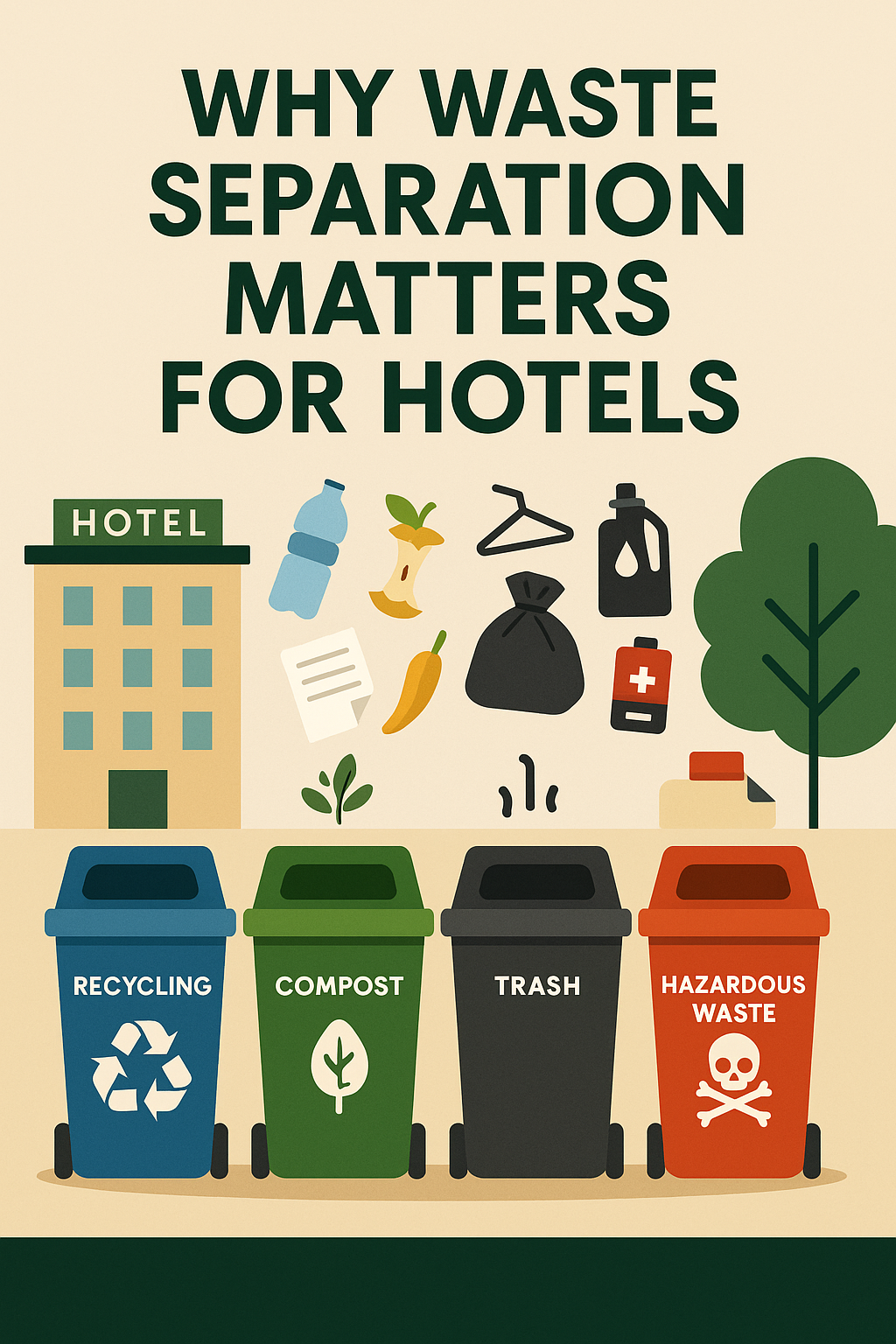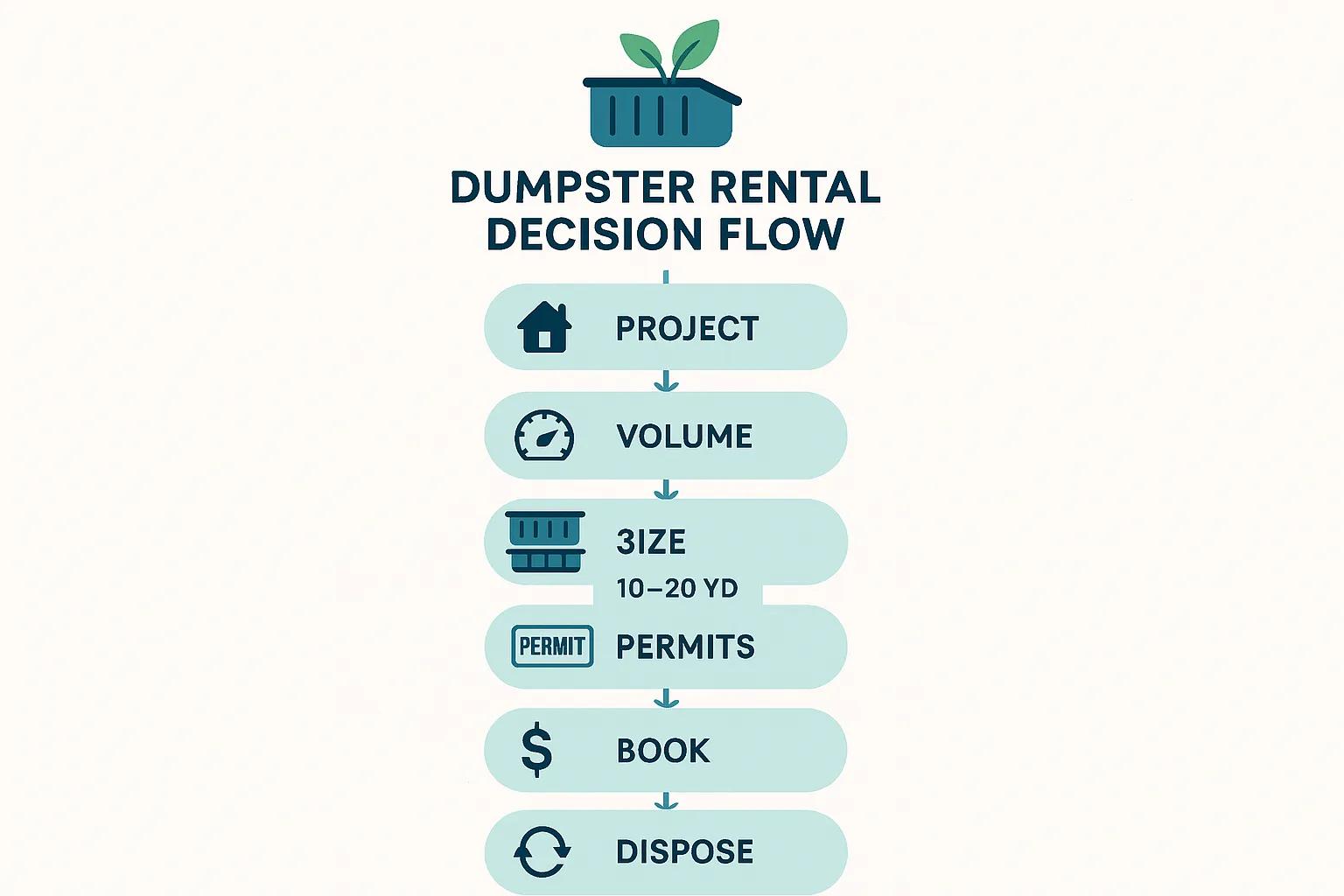
Why Waste Separation Matters for Hotels: 15 Crucial Reasons to Rethink Your Trash Strategy Today
By BKThemes
Introduction to Hotel Waste Management
Hotels are like miniature cities—they host hundreds or even thousands of people daily, serve meals around the clock, and consume vast amounts of resources. As a result, they produce a staggering amount of hotel waste. From leftover food and plastic packaging to paper, electronics, and cleaning supplies, managing all this waste responsibly is a challenge that can’t be ignored.
Waste management in the hospitality industry is no longer just about hauling trash away. It’s about managing resources smartly, reducing environmental harm, and meeting the expectations of eco-conscious travelers.
What Is Waste Separation?
Waste separation is the process of sorting waste into categories—typically recyclables, compostables, hazardous waste, and general trash—before disposal. This is a vital step in making sure reusable or recyclable materials don’t end up in landfills.
Hotels, with their various departments (kitchen, housekeeping, front office, maintenance), generate many types of waste. Each department can contribute by separating waste at the source, making it easier and more efficient to process later.
The Environmental Impact of Hotel Trash
When hotel trash is not properly separated, it ends up in landfills where it releases harmful greenhouse gases like methane. Plastics can take hundreds of years to decompose, and toxic materials like batteries or cleaning chemicals can contaminate soil and water.
Hotels that fail to practice good waste management{:rel=“nofollow noopener”} contribute to pollution, loss of biodiversity, and climate change. On the flip side, implementing a smart waste separation system helps reduce environmental damage and demonstrates a commitment to sustainability.
Regulatory Compliance and Legal Risks
Many countries and cities have waste separation laws in place. Hotels that ignore these rules may face heavy fines, legal trouble, or even business restrictions. Waste audits and surprise inspections are becoming more common in urban areas and eco-tourism hotspots.
By investing in compliant hotel waste systems, hotel owners can avoid unnecessary penalties while aligning with growing environmental regulations.
How Hotels Can Implement Waste Separation
Here’s how to make waste separation practical in a hotel setting:
-
Color-coded bins{:rel=“nofollow noopener”}: Use blue for recyclables, green for compost, black for general waste, and red for hazardous waste.
-
Train staff regularly on sorting practices.
-
Signage and infographics: Help guests and staff know what goes where.
-
Smart bins: These detect and sort waste automatically using sensors.
A successful waste separation program needs leadership support, clear communication, and routine monitoring.
The Role of Hotel Dumpsters in Waste Separation
Hotel dumpsters are the final destination before trash is hauled away, so getting this step right is key:
-
Use segregated dumpsters for different types of waste (e.g., recycling-only dumpsters).
-
Place dumpsters in accessible, well-marked areas.
-
Lock hazardous waste dumpsters to prevent misuse.
-
Clean them regularly to avoid pests and bad odors.
Investing in the right hotel dumpsters{:rel=“nofollow noopener”} supports cleaner, safer, and more efficient waste operations.
Economic Benefits of Waste Management
Contrary to what many believe, proper waste management saves hotels money over time. Here’s how:
| Strategy | Savings |
|---|---|
| Recycling programs | Cuts disposal costs |
| Food waste reduction | Saves on purchasing and disposal |
| Energy-from-waste initiatives | Can generate income or energy credits |
| Composting | Reduces trash volume and pickup frequency |
Why Waste Separation Matters for Hotels: 15 Crucial Reasons to Rethink Your Trash Strategy Today
Introduction to Hotel Waste Management
Hotels are like miniature cities—they host hundreds or even thousands of people daily, serve meals around the clock, and consume vast amounts of resources. As a result, they produce a staggering amount of hotel waste. From leftover food and plastic packaging to paper, electronics, and cleaning supplies, managing all this waste responsibly is a challenge that can’t be ignored.
Waste management in the hospitality industry is no longer just about hauling trash away. It’s about managing resources smartly, reducing environmental harm, and meeting the expectations of eco-conscious travelers.
What Is Waste Separation?
Waste separation is the process of sorting waste into categories—typically recyclables, compostables, hazardous waste, and general trash—before disposal. This is a vital step in making sure reusable or recyclable materials don’t end up in landfills.
Hotels, with their various departments (kitchen, housekeeping, front office, maintenance), generate many types of waste. Each department can contribute by separating waste at the source, making it easier and more efficient to process later.
The Environmental Impact of Hotel Trash
When hotel trash is not properly separated, it ends up in landfills where it releases harmful greenhouse gases like methane. Plastics can take hundreds of years to decompose, and toxic materials like batteries or cleaning chemicals can contaminate soil and water.
Hotels that fail to practice good waste management contribute to pollution, loss of biodiversity, and climate change. On the flip side, implementing a smart waste separation system helps reduce environmental damage and demonstrates a commitment to sustainability.
Regulatory Compliance and Legal Risks
Many countries and cities have waste separation laws in place. Hotels that ignore these rules may face heavy fines, legal trouble, or even business restrictions. Waste audits and surprise inspections are becoming more common in urban areas and eco-tourism hotspots.
By investing in compliant hotel waste systems, hotel owners can avoid unnecessary penalties while aligning with growing environmental regulations.
How Hotels Can Implement Waste Separation
Here’s how to make waste separation practical in a hotel setting:
-
Color-coded bins: Use blue for recyclables, green for compost, black for general waste, and red for hazardous waste.
-
Train staff regularly on sorting practices.
-
Signage and infographics: Help guests and staff know what goes where.
-
Smart bins: These detect and sort waste automatically using sensors.
A successful waste separation program needs leadership support, clear communication, and routine monitoring.
The Role of Hotel Dumpsters in Waste Separation
Hotel dumpsters are the final destination before trash is hauled away, so getting this step right is key:
-
Use segregated dumpsters for different types of waste (e.g., recycling-only dumpsters).
-
Place dumpsters in accessible, well-marked areas.
-
Lock hazardous waste dumpsters to prevent misuse.
-
Clean them regularly to avoid pests and bad odors.
Investing in the right hotel dumpsters supports cleaner, safer, and more efficient waste operations.
Economic Benefits of Waste Management
Contrary to what many believe, proper waste management saves hotels money over time. Here’s how:
| Strategy | Savings |
|---|---|
| Recycling programs | Cuts disposal costs |
| Food waste reduction | Saves on purchasing and disposal |
| Energy-from-waste initiatives | Can generate income or energy credits |
| Composting | Reduces trash volume and pickup frequency |
Frequently Asked Questions (FAQs)
1. Why is waste separation important in hotels?
Waste separation helps hotels reduce their environmental impact, save money, comply with regulations, and appeal to eco-conscious guests. By sorting hotel waste at the source, recyclable and compostable materials can be reused instead of being sent to landfills.
2. What types of waste are most common in hotels?
Hotels typically produce food waste, plastics, paper, glass, metal, textiles, and hazardous waste (like batteries or cleaning chemicals). Effective hotel waste separation means handling each category correctly to minimize harm and maximize recycling.
3. How can hotels encourage guests to separate waste?
Hotels can use clear signage on bins, provide in-room recycling options, include sustainability information in check-in materials, and showcase their commitment to green practices on websites and social media.
4. What are the costs of setting up a waste separation program?
Initial costs may include purchasing color-coded bins, training staff, and setting up systems. However, many hotels recover this investment through reduced disposal fees, food waste reduction, and even tax incentives for sustainability programs.
5. Can waste separation improve a hotel’s brand reputation?
Absolutely. Hotels that demonstrate environmental responsibility often attract positive media attention, better guest reviews, and increased bookings from eco-conscious travelers. It’s also a valuable differentiator in competitive markets.
6. What role do hotel dumpsters play in waste management?
Hotel dumpsters are critical to the end of the waste journey. When appropriately labeled and placed, they ensure that separated waste stays sorted until pickup. Having the right size, type, and number of dumpsters prevents overflow and contamination.
Conclusion: Making Sustainability the Standard
Hotel waste separation is no longer just a nice-to-have—it’s a must. With rising waste disposal costs, stricter regulations, and growing environmental awareness, hotels must take proactive steps to manage their hotel waste responsibly.
From training staff and choosing the right hotel dumpsters to reducing food waste and leveraging technology, every effort counts. The benefits are undeniable: reduced environmental harm, improved brand image, cost savings, and happier guests.
When done right, waste separation is not just a responsibility; it’s a smart business decision. It’s time for hotels, both big and small, to rethink their approach to trash and lead the way toward a cleaner, greener, more sustainable future.
🌿 Remember: Sustainable hospitality starts with one bin, one habit, and one committed team. Make waste separation a part of your hotel’s story—because the planet, your guests, and your bottom line all depend on it.
External Resource:
To learn more about sustainable hotel waste practices, visit Green Hotelier.



